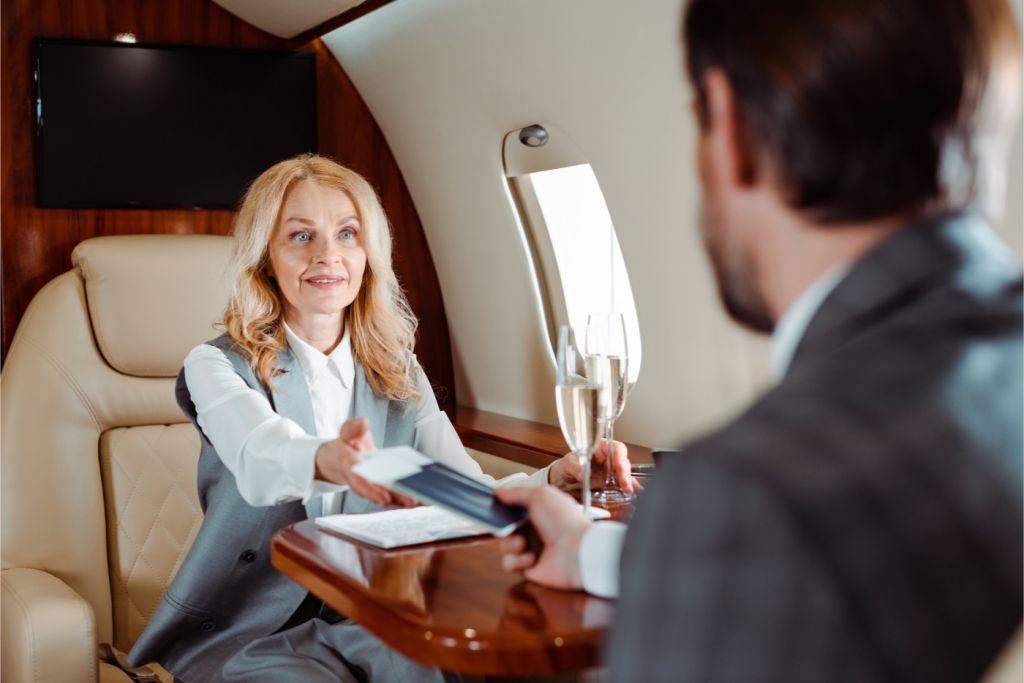Navigating the norms of tipping can be challenging, especially when flying in the high-end environment of first class. This guide helps you with gratuities at 30,000 feet.
Tipping in first class on flights is generally not expected. Most airlines have policies that discourage or prohibit flight attendants from accepting tips. If you wish to express gratitude for exceptional service, verbal appreciation or a comment to the airline is more appropriate.

When you're flying first class, you enjoy premium service, but you might wonder if and how you should show appreciation to the flight attendants. Let's explore the appropriate times to offer a tip and how to do so when cash isn't an option.
| Situation | Suggested Tip | Additional Information |
|---|---|---|
| Exceptional Service in First Class | Discretionary | For going above and beyond, especially with personalized attention |
| Non-Cash Options | Gift cards or small gifts | When cash isn't available; ensure it's modest and for personal use |
| Credit Card Purchases | Add tip electronically | If the airline allows, for convenience |
While tipping in first class isn't a standard practice, you might consider offering a tip for exceptional service or if the flight attendant goes above and beyond their duties. If you receive personalized attention, such as assistance with special requests or proactive service that enhances your travel experience, a tip can be a thoughtful way to express your gratitude.
If you'd like to tip but don't have cash on hand, you're not out of options. Non-cash gifts such as gift cards can be an excellent alternative. A modest gift card to a popular retailer or coffee shop is something almost anyone can appreciate. Alternatively, you can offer a gift card as part of a small non-cash gift, as long as it's clear that it's for personal use and not overly extravagant. When using a credit card onboard for purchases, some airlines allow you to add a tip electronically, which can be a convenient approach to express your appreciation.
When you're flying first class, understanding the nuances of tipping culture can enhance your travel experience. Let's navigate the customs that may vary widely by country and consider how they apply to your journey.
When you travel in first class, you experience a level of service and comfort that goes beyond what is available in other cabins.
First class cabins pamper you with a range of exclusive services. You can expect to receive:
First Class vs. Economy: Economy class offers basic amenities and often tighter seating arrangements. Meanwhile, first class provides you with a luxury retreat in the sky.
First Class vs. Business Class: Business class is a middle ground between first class and economy. The differences include:
In first class, you're not just buying a seat on a plane; you're securing an exclusive experience that starts at the airport and continues until you reach your destination.
When you're flying first class, knowing whether to tip can be a bit confusing given the luxurious service. Here's what you need to know about the policies that airlines have in place and how they affect the wages of those ensuring your safety and comfort.
Most airlines hold firm policies that either discourage or outright prohibit tipping flight attendants. This standard is in place because your ticket already includes the level of service you receive up in the air. Moreover, cabin crew members are salaried, unlike some service industry professionals who may rely heavily on tips.
The issue of tipping does not typically influence the wages of flight attendants, as they are compensated by the airlines they work for. They're seen as safety professionals first, trained for emergency situations and ensuring the overall safety of passengers.
When you're flying first class, whether you tip can be influenced by several factors, from the service you receive to understanding the role of flight attendants.
In first class, exceptional service is often a given, but when it goes above and beyond, you might feel a sense of gratitude that compels you to tip. Top-notch personalized attention or unexpected perks during your flight could be the deciding factors for showing appreciation with a tip.
Remember that flight attendants are primarily there for your safety. Their training focuses on ensuring a safe flight, and their roles extend beyond customer service. While tipping is more common in roles centered on customer service, the unique professional responsibilities of flight attendants tend to make tipping less expected.
Consider other forms of appreciation if you're hesitant about offering cash. Small gifts or tokens of thanks can be a meaningful way to acknowledge the work of your flight attendants. A simple "thank you" also goes a long way in recognizing the dedication and hard work that goes into your flying experience.
When you're traveling in style, tipping can be a form of showing appreciation. It’s essential to understand tipping etiquette in different travel scenarios to ensure you're expressing your gratitude appropriately.
In airport lounges, tipping etiquette varies by country and establishment. Generally, if a bartender serves you a drink, a tip of $1-2 per drink is considerate. For more personalized service, or if you're using the lounge's facilities for an extended period, a larger tip may be appropriate. Remember, some lounges include gratuities in the entrance fee, so it’s worth checking lounge policies.
On international flights, particularly in first class, the norm for tipping flight attendants is not well-defined. It is not expected to tip flight attendants, as airlines compensate them for premium service. However, should you experience exceptional service that enhances your journey, a small, discreet token of appreciation is often appreciated. Keep in mind that cultural norms vary, and what is acceptable on one airline may not be on another.